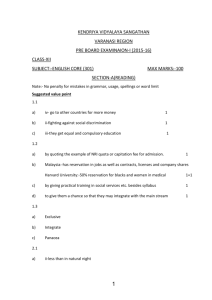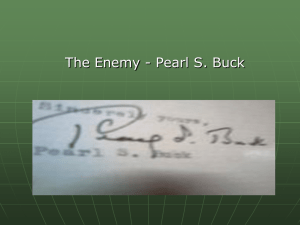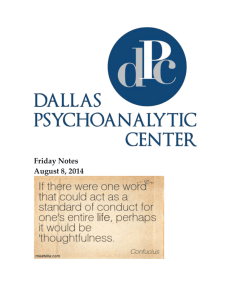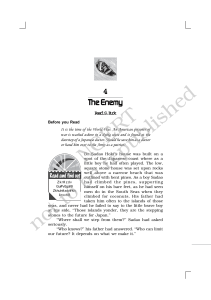KV AFS ARJANGARH ENGLISH CORE CLASS CORE 2015
advertisement
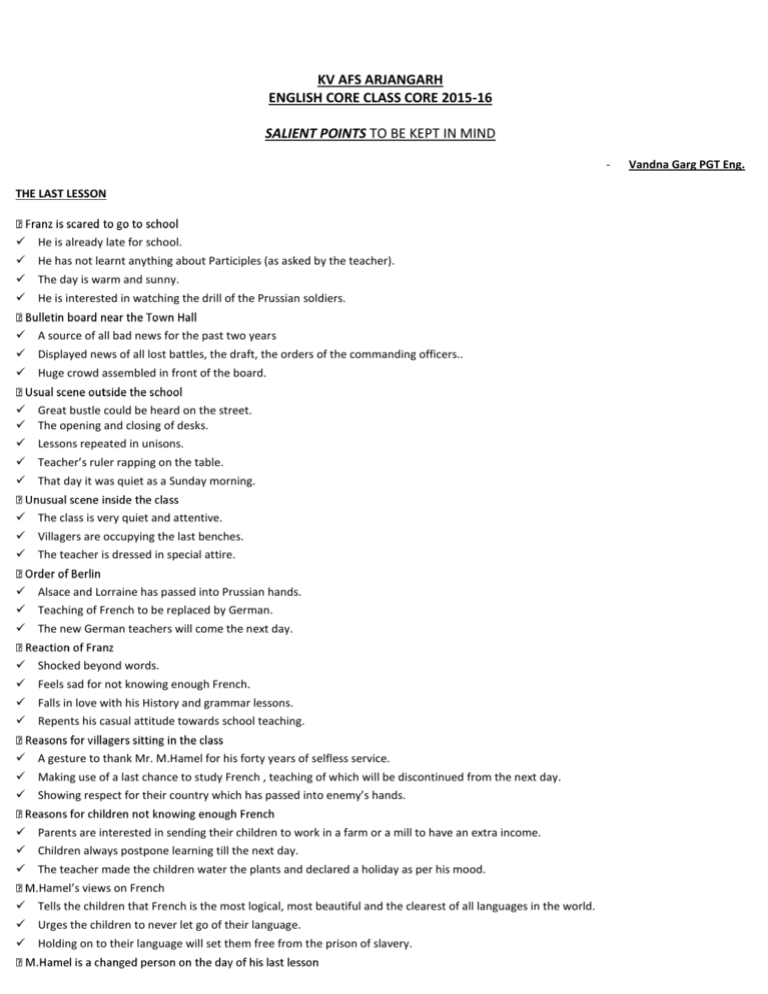
KV AFS ARJANGARH ENGLISH CORE CLASS CORE 2015-16 SALIENT POINTS TO BE KEPT IN MIND THE LAST LESSON He is already late for school. He has not learnt anything about Participles (as asked by the teacher). The day is warm and sunny. He is interested in watching the drill of the Prussian soldiers. A source of all bad news for the past two years Displayed news of all lost battles, the draft, the orders of the commanding officers.. Huge crowd assembled in front of the board. Great bustle could be heard on the street. The opening and closing of desks. Lessons repeated in unisons. Teacher’s ruler rapping on the table. That day it was quiet as a Sunday morning. The class is very quiet and attentive. Villagers are occupying the last benches. The teacher is dressed in special attire. Alsace and Lorraine has passed into Prussian hands. Teaching of French to be replaced by German. The new German teachers will come the next day. Shocked beyond words. Feels sad for not knowing enough French. Falls in love with his History and grammar lessons. Repents his casual attitude towards school teaching. A gesture to thank Mr. M.Hamel for his forty years of selfless service. Making use of a last chance to study French , teaching of which will be discontinued from the next day. Showing respect for their country which has passed into enemy’s hands. Parents are interested in sending their children to work in a farm or a mill to have an extra income. Children always postpone learning till the next day. The teacher made the children water the plants and declared a holiday as per his mood. Hamel’s views on French Tells the children that French is the most logical, most beautiful and the clearest of all languages in the world. Urges the children to never let go of their language. Holding on to their language will set them free from the prison of slavery. Vandna Garg PGT Eng. Does not scold Franz for coming late to school. Does not say anything when children are unable to answer questions on Participles. Is full of immense patience as if he wants to put all his knowledge in the minds of his students. Has made a special effort for his class by bringing a separate notebook for each student with –France, Alsace, France, Alsace written for practice. Tells children about the beauty of French and never to give up on their language. THE LOST SPRING ‘Sometimes I find a Rupee in the garbage’ Hails from Dhaka, Bangladesh Their homes and fields were swept away by the storm Migrated to Delhi in search of better opportunities Stays in Seemapuri , Delhi Involved in rag picking Very keen to go to school Wants to own a pair of shoes Loves roaming around with his friends after work Likes the game of tennis Asks Saheb the reason for not attending school ‘ Lack of school in the neighbourhood’ is Saheb’s response Promises absent mindlessly that she will open a school Saheb returns a few days later inquiring about her school Author feels embarrassed She made a promise that was not meant to be Adults : their daily bread/ roof over their heads/ means of survival Children: wrapped in wonder/hope of finding something new everyday It has acquired a proportion of a fine art in Seemapuri Structures of mud and roofs of tin and tarpaulin No sewage, drainage or potable water Illegal ration cards have given them access to subsidized food grains Voter ID card is made on the basis of ration cards Politicians come every five years asking for votes in lieu of development of Seemapuri ( This promise, like the author’s, is not meant to be) Women in tattered saris Rag picking is the main profession of the migrant population Has started working in a tea stall Gets 800 rs. and all his meals Works from morning to night Not happy in his new job Lost his identity, freedom and sense of belongingness The steel canister seems heavy ( a burdensome job) Saheb-e-Alam ( lord of the universe) is forced to live a life of poverty and deprivation(his name is ironical ) ‘Saheb is no longer his own master’ “ I want to drive a car” A bangle maker from Firozabad( centre of India’s glass blowing industry ) Wants to become a motor mechanic Terms it as ‘karma , destiny’ A God given lineage Has witnessed her husband going blind Sit for hours together in front of furnace with high temperatures Work in ill –ventilated rooms with dim light and poor air outlet Their eyes are more adjusted to darkness than to light Children become partially/fully blind by the time they are adults The dust from polishing the bangles cause irrepairable damage to the eyesight to a cooperative society Mind numbing toil has killed their sense of initiative Absence of able leadership Policemen will lock them up in a jail for employing child labour. Never been taught to dream and dare t world One : poverty looming large in the families burdened by the stigma of the caste which does not allow them to follow any other profession. Two : Vicious circle of the sahukars, middlemen, policemen, bureaucrats, politicians –Their fear grips them hard. Together they have imposed a heavy baggage on the children which impinges with their growth. Saheb, optimistic and enthusiastic-prospect of finding gold in garbage-likes going to school but no opportunity-freedom and joy of childhood to burdens of job at tea-stall.The people have illegal ration cards on the basis of which they have voter’s ID. They are exploited by the local politicians who treats them as a mere vote bank and lures them with false promise of development of the area. Mukesh, born at Firozabad (bangle maker) - works under inhuman condition - dark room, hot furnaces - caught in web of poverty vicious circle of sahukars, policemen, politicians, bureaucrats and moneylenders-resigned to fate-unaware of child labour act-stifled initiation and hope-lose eyesight before becoming adults. DEEP WATER Douglas Had great passion for water He longed to learn swimming. When he was three or four years, he was taken to a Beach in California by his father. While surfing on the shore, a huge wave knocked him. He feared water. That was his childhood fear. After some years he longed to swim in the Yakima River but his mother warned against that idea. the yakima river is treacherous. Then he found the YMCA Pool the safest place for swimming. Its deepest end was six feet deep, the bottom was tiled, the drop towards the deep part was gradual, water was clean and there were other children swimming. He went to the pool and started swimming by imitating other boys. One day, while waiting for the other boys to come, a big boy threw him into the deepest end of the water. Douglas had the courage to face the situation. He went down and down with a hope to reach the bottom to make a big leap upward. Three times he went down and on the third time, he lost consciousness and almost died! Douglas gives a vivid description of death which is peaceful. Douglas’ ‘body’ floated on the surface. Someone dragged him out of the water and provided first aid. After this incident, Douglas tried to avoid water and water sports as much as possible. When he grew up, water began to tempt him again. He got a trainer and learnt swimming. After the completion of the training, he went to various rivers, pools, lakes and swam alone and got rid of his fear. Instructor In October Douglas got an instructor for swimming. In three months, his fear began to fade. Instructor employed a three pronged approach. Tied a belt around /connected it to a rope attached to a pulley Taught him to inhale and exhale under water Taught him to kick his feet under water Bit by bit he shed his fears. Getting rid of Fear After the instructor was done, Douglas started a self training. He went to the following rivers and lakes: Lake Wentworth (New Hampshire) Triggs Islands Stamp Act Island Tieton – Conrad Meadows Conrad Creek Trail – Meade Glacier Warm lake He conquered the fear of water for ever. THE RAT TRAP ‘The Rattrap’ is a story that underlines the belief that essential goodness in human beings can be aroused through sympathy, understanding and love. soul together. – the whole world is a big rattrap and it offers riches as bait. attrap peddler sought shelter in an old crofter’s roadside cottage. and got lost. the ragged wretch near the furnace. im to stay for Christmas Eve only. iff. She made him understand that if he wanted rest and peace he would be welcome next Christmas also. This had a miraculous effect on him. peddler had already left but had not taken anything at all with him. Instead, he had left a small packet for the young girl as a Christmas present. -Krona notes and also a letter with a request to return the Kroners to the crofter. INDIGO Raj Kumar Shukla- A poor sharecropper from Champaran wishing to meet Gandhiji. Raj Kumar Shukla- an illiterate but resolute hence followed Gandhiji Lucknow, Kanpur, Ahemdabad, Calcutta, Patna, Muzzafarpur & then Champaran. Servants at Rajendra Prasad’s residence thought Gandhi to be an untouchable. Gandhiji considered as an untouchable because of simple living style and wearing, due to the company of Raj Kumar Shukla. Decided to go to Muzzafarpur first to get detailed information about Champaran sharecropper. Sent telegram to J B Kriplani and stayed in Prof. Malkani’s home - a government servant. Indians afraid to show sympathy to the supporters of home rule. The news of Gandhi’s arrival spread- sharecroppers gathered in large number to meet their champion. Gandhiji chided the Muzzafarpur lawyer for taking high fee. Champaran district was divided into estate owned by English people, Indians only tenant farmers. Landlords compelled tenants to plant 15% of their land with indigo and surrender their entire harvest as rent. In the meantime Germany had developed synthetic indigo –British landlords freed the Indian farmers from the 15% arrangement but asked them to pay compensation. Many signed, some resisted, engaged lawyers, landlords hired thugs. Gandhiji reached Champaran- visited the secretary of the British landlord association to get the facts but denied as he was an outsider. Gandhiji went to the British Official Commissioner who asked him to leave Trihut, Gandhiji disobeyed, went to Motihari the capital of Champaran where a vast multitude greeted him, continued his investigations. Visited maltreated villagers, stopped by the police superintendent but disobeyed the order. Motihari black with peasants’ spontaneous demonstrations, Gandhi released without bail Civil Disobedience triumphed. Gandhiji agreed to 25% refund by the landowners, it symbolized the surrender of the prestige. Gandhiji worked hard towards social economic reforms, elevated their distress aided by his wife, Mahadev Desai, Narhari Parikh. Gandhiji taught a lesson of self-reliance by not seeking help of an English man Mr. Andrews GOING PLACES Sophie Sophie belonged to a poor family. She wanted to own a boutique, she wanted to be an actress, and she wanted to be a fashion designer and much more. ould not achieve them Sophie Tells a Lie After an interval Sophie came with another sophisticated lie: traction for the English youth. The Lie Spreads Geoff took the story to their father and then proudly to his friends. Lie or Truth? Days passed and everyone forgot Sophie and her Casey. By this time the effect of telling the lie continuously made Sophie believe her own lie. She could not think of it in clear lights. Victim of a Lie The Saturday on which Sophie was to meet Casey finally arrived. ave way to doubts. put herself in such a situation. She rose and walked back. MY MOTHER AT SIXTY SIX The poet is driving from her parent’s home to Cochin airport by car, her mother is sitting beside her—dozing with open mouth—pale, colorless and frail like a dead body. The poet looks at her and feels disturbed and mental agony that soon death will cast away her mother from her. She turns away her attention, looks outside at the young trees and happy children coming out of their homes in a playful mood. After the security check at the airport looked back at her mother’s face—lifeless, wrinkled and pale. She hides her sentiments and reassures her mother that they will meet again .She smiles at her and assures her that she will meet her soon. AN ELEMENTARY SCHOOL CLASSROOM IN A SLUM vitality and their unkempt hair is spread on their pale faces. The classroom is strung together with “donations” that are apparently doled out to the slum classroom by the rich people. There are five things displayed in the class .1) Shakespeare’s head 2) a painting of dawn 3) a picture of dome 4) a scenery showing belled, flowery, Tyrolese valley 5) a world map. These things related to the good aspects of life and displayed on the sour cream walls are in sharp contrast to the lives of these children. nts’ futures. He calls Shakespeare “wicked” because in his plays Shakespeare talks of ships (conquests), sun (epitome of hope and life) and love. He gives these children ideas of escape from “ lead “ skies to “ sun” filled worlds. He raises the expectations of these children and because there aren’t adequate means to fulfill these expectations, it is “tempting them to steal”. He is assisting the slum to commit crime. The poet also calls “the map a bad example” because maps are promises of a better horizon while these children are destined to spend their lives in “cramped holes”. Theirs is not a journey from darkness to light but from ignorance (“fog”) to death (“endless night”). Their bodies are merely a burden (“heap”) of waste (“slag”).They are so thin that the bones peep through the skin. They wear “spectacles of steel / With mended glass”. Their life is mended and never whole. Their existence is like “bottle bits on stones”- shattered, scattered. All their time and space are consumed by “foggy slum”. The overwhelming slum ( as overwhelming as death-“doom”) is a big blot on the civilized world. It also shows that the haziness (fog) has blotted their fate. e last stanza, Spender comes full circle. Hopelessness is replaced by hope and pessimism is replaced by optimism. The dim atmosphere of the class is replaced by an array of colours- green, azure and gold. The monotonus lives of these children only undergo a change when governors, inspectors and visitors come to the school. He is imploring the authorities to do away with temporary solution like donation and impart quality education to the children of slum . Only education can liberate these children from a restrictive life. The poet has immense faith in education as he feels that “history theirs whose language is the sun”. Sun is symbolic of the light of knowledge. It also symbolizes equality because when the sun shines, it makes no discrimination between a king’s palace and a poor man’s hut. Education is a great liberator and equalizer. KEEPING QUITE necessity of quiet introspection and creating a feeling of understanding among human beings. world, for in that moment of silence and inactivity we would all be one. out seeing the larger picture. eed introspection, and this is possible only in moments of suspended activity. and observe the miraculous consequences of the same. n the absence of the hustle and bustle of life there would be a feeling of peace and quiet, and we would be united in our mutual commitment. destroy nature and wars would cease. void, resulting in complete harmony between human beings themselves and between man and nature. et does not wish to advocate total inactivity or death but laments the fact that in our single minded desire to keep our lives active we lose sight of our true goals and in so doing we reach a stage when we have no leisure to either understand ourselves or our fellow human beings. exist between man and nature. destruction. Our survival and that of the world rests upon our ability to comprehend this and thus divert this sad eventuality. A THING OF BEAUTY A thing of beauty is a joy forever. It does not pass into nothingness but its beauty keeps on increasing. It gives us sound sleep and good health; This world is full of frustrations, disappointments and dearth of noble people. These make our life gloomy and sad. But things of beauty remove the pall and sadness from our spirits. Nature is a constant source of happiness for human beings. The beautiful things are – sheep, daffodils, clear streams, musk roses and forest thickets. These things soothe and make us happy. Stories of heroes who have died in peace of war are also things of beauty and have a stimulating effect. But the beauties of nature are lovelier than all the lovely tales and are like the immortal drink from heaven. CENTRAL IDEA Value points: Things of beauty-endless fountain of nectar. They dispel darkness & sadness from our lives. Beautiful things are in different forms-nature, heavenly bodies, art literature. Man is inspired by beautiful things on earth to live happily AUNT JENNIFER’S TIGERS Theme Victimization of women by their male counterparts. Strongly expresses the evils of patriarchy. Therefore, clearly feminist poem revolving around male chauvinis & gender conflicts. The poet is a feminist and she addresses the ordeals of a married woman *She spends good amount of time in embroidering panel of tigers prancing across the screen. *The tigers are fearless creatures pacing elegantly and majestically. They symbolize the spirit of freedom. Aunt is the victim of male chauvinism *’The Weight of Uncle’s Wedding band ‘ –expresses how victimized and oppressed she is .It implies that Aunt Jennifer has to work hard to meet his expectations. *She spends her life in fear but she embroiders on the panel the fearless and courageous tigers to express her secret longing for a life of freedom and confidence *Even her death does not end the problem and constraints which a married woman experiences. THE TIGER KING The Maharaja Sir Jilani Jung Jung Bahadur was called “Tiger King”. that he would be killed by a tiger. He uttered “Let tigers beware!” milk, taught by an English tutor, looked after by an English nanny and watched English films. reached the Maharaja’s ear and he in turn to safe guard himself killed a tiger and being thrilled he told the astrologer who replied that he can kill 99 tigers but should be careful with the100th. e that was fond of hunting tiger and his wish was declined. was rejected. instead she kept all the rings costing 3 lakh rupees and sent ‘thanks’ to the Maharaja. But his state was secured. find any in Pratibandapuram so he decided to marry agirl from royal state which had more tigers to complete his target. -laws he killed 5-6 tigers. So he killed 99 tigers and was feverishly anxious to kill the 100thbut couldn’t find. an old tiger and placed it in the forest and informed the Maharaja. a took great care and shot the tiger and left the place with great triumph. tiger and brought it in grand procession. aja’s son and he wanted to buy a present from the toyshop. He bought a wooden tiger which was poorly carved. right hand which later on caused his death. Thus the hundredth tiger takes his final revenge upon the “Tiger King”. THE ENEMY Sadao and Hana:Sadao was Japanese. His father was a patriot. He sent Sadao to America to study surgery. Sadao met Hana there, a pure Japanese. They came home and married according to the old Japanese customs. They had two children. An American Soldier is washed up to their house.:They thought of throwing back in to the sea. ¨But they could not do so. He plunged the wound to stop the bleeding, carried him home. Hana washes the soldier:They decided to tell the servants. They would hand him over to the police as soon as the man recovered. Yumi looked at the American with repulsion. She refused to wash the dirty American. Hana shouted but Yumi refused and remained stubborn Sadao operates on the American:Sadao and Hana look after the American:His wound was healing and he was gaining strength They wished the American to be handed over to the police without any further delay. Servants leave Sadao’s house:¨Hana paid them their wages. ¨They cried as they left. Hana held back her tears. The arrival of a messenger:In the evening a messenger in uniform arrived. Hana was paralyzed with fright. She felt the servants must have complained and the messenger had come to arrest Sadao. The fears were unfounded the old general had been suffering from an ailment. Sadao had been treating him. The general was in pain and had sent for him. Sadao cannot be arrested:Sadao had told the general about the American. The general told him that he was indispensable and could not be arrested. General suggested a way out he would send two of his private assassins to his house to kill the American quietly and remove the body. ¨Sadao agreed to the plan. Sadao waited for 3 nights. No assassins arrived. The American was getting better. He thanked Sadao. Sadao helps the American to escape:Sadao tells the General about the escape:Sadao told the general that the prisoner had escaped. The general recalled he had failed to send the assassins Servants return:As the American had left all the servants returned. Things came back to normal. Sadao remembered the American and hated him. But did not know why he saved his life and not kill him. SHOULD WIZARD HIT MOMMY THEME The author brings into focus the impatience and insensitivity that adults display in their dealings with children and the tolerance they exhibit if they feel that their authority is being questioned .He also highlights the adults’ habit of imposing their opinion on children and that of discouraging any queries. ep in .The story also reveals the world view of a little child to a difficult moral question that shows her mental or psychological richness . Jo ,the four year old daughter of Jack , has been subjected to a ritual of bed time story telling by her father .She is captivated by each story and gets so involved in it that she asks questions on it and even predicts the next move or development in the tale. izard waved his magic wand and made Roger smell like roses. ed him to restore the original smell . She wanted her son to keep his identity of a skunk and wanted his friends to accept him for himself. So the wizard changes him back to smell like skunk. h ending . She thinks that Skunk is better off with his new smell and is thus more acceptable and has more friends . er was not ready to do to establish his authority . This raises a difficult moral question whether parents possess the right to impose their will on their children . finds it difficult to answer question. ON THE FACE OF IT The play On The Face of It by Susan Hill focuses upon the sense of alienation ,loneliness that is experienced by disabled or cripple. Protagonist of the play, Derry ,a young boy of fourteen has been burnt by acid and disfigured his face. ers . He is often subjected to stare from people who are either scared of his ugly face or disgusted by it .This makes him hate people and seek solitude, in order to escape from hurtful remarks. an acute sense of self hatred and rejection m with a love for life and the curiosity to discover the simple joys of everyday living. earn to discover the beauty in things. set about people and things. o curtains in his windows .She stops him but he is adamant. ly , he finds Lamb dead . ing life of physically disabled people with their alienation, aloofness and loneliness. VALUE POINTS –the sense of alienation caused by a disability is indeed more painful than acute inconvenience caused by a physical impairment. ----Derry suffers no physical pain from burnt face--- but deeply hurt by the horror, disgust and pity displayed by those who see him-insensitive behaviour of others.----caused mental trauma and agony---called Lamey Lamb ,mother was afraid of sending the children because of his tin leg ----Both Mr. Lamb and Derry have been victims of verbal atrocities ----Mr. Lamb takes comments lightly---But Derry does not have the attitude like Mr. Lamb ----attitude and mind set of the people needs to be changed ---Wounds get healed---but bitter comments never forgotten leaves a scar. EVANS TRIES AN O-LEVEL rice .His ability to break away had earned Evans the title of’ Evans the Break’. -level German exam which was also an effort to break the Oxford Prison. The Governor takes utmost care to see that he would not be fooled hat he had hardly any chance of getting through .But he gives an ironical twist by saying ‘I may surprise everbody’ k away everything like nail ,razor, scissors etc .that may help him injure himself . Evans was insisted to take away the hat but he refused saying that it was lucky charm. nversation . The invigilator Rev. S. Mcleery was searched and left him to complete the task . he invigilator(actually Evans) wounded , informed the Governor .Governor was furious and he scolded the prison officers for their negligence .He was hospitalized but informed that he was alright . to find him ‘bound and gagged in his study room’ . He has been there since morning. Now everything was clear to the Governor. otel where Evans was hidden and arrested him . Evans surrenders himself to the Governor. ing that Governor was just ‘ good for a giggle’. MEMORIES OF CHILDHOOD PART 1 –Sa and Bama .They reveal the feelings of sadness, indignation and outrage experienced by two women of marginalized communities. ns of society. ng clothes and tight shoes that were considered undignified in her culture. hair .She protested by hiding under the bed , even though she knew that it was futile .In her culture , it was the cowards whose hair was shingled . led. PART II d because he comes from lower section of society. thought but very pathetic. The people from the lower caste were treated as untouchables. scrimination and she proved her potential and earned honour for her community. NOVEL THE INVISIBLE MAN Character List Griffin The Invisible Man. He is an albino college student who had changed his area of study from medicine to physics and had become interested in refractive indexes of tissue. During his studies he stumbled across formulas that would render tissue invisible. Eventually he tries the formula on himself, thinking of all the things he could do if he were invisible. Unfortunately, the conveniences are far outweighed by the disadvantages; Griffin turns to crime as a means of survival Mr. Marvel The first character whom Griffin tries to use as an accomplice. Mr. Marvel is short, fat, and a loner. He is the area tramp. Griffin perhaps also thinks that he is a little stupid and will thus not be able to resist and will not be believed if he tries to tell anyone about his predicament. Dr. Kemp A former associate of Griffin’s in his college days. Griffin had been a student and knew Kemp to be interested in bizarre, and idiosyncratic aspects of science. It is to Kemp’s house that Griffin goes in his final attempt to find an accomplice and live a more normal life. Kemp, however, has no particular sense of loyalty to a former student and is not prepared to participate in Griffin’s grand schemes. He is also more deceitful than Griffin knows and betrays the invisible man even while pretending to accept his confidences. Minor Characters The Halls Proprietors of the Coach & Horses. Mrs. Hall is the one who is primarily in charge. She is happy enough to leave Griffin alone so long as her money is coming in on time. Her husband is more suspicious but does not interfere until Griffin’s behavior starts to become obvious. Teddy Henfrey A clock repairman who happens to visit the inn for a cup of tea. Mrs. Hall takes advantage of him to try to find out about her strange guest. Because the stranger will not talk, Teddy convinces himself that the man is someone of a “suspicious” nature. Teddy begins the rumors about the man being wanted by the police and merely wrapping himself up to conceal his identity. Fearenside A cartman who delivers luggage from the station whenever he is needed. He notices darkness through a torn pant leg where there should be pink flesh and starts the stories of Griffin being either a black man or a piebald. Cuss A general practitioner who attempts to get an interview with Griffin. He is the first to realize he actually see emptiness where there should be flesh and bone. He also tells an outrageous story to his companions in town after Griffin terrifies him by pinching his nose with an invisible hand. Mr. And Mrs. Bunting Bunting is the vicar. Cuss takes his story to Bunting. The next evening Bunting and his wife hear noise in their house after they have gone to bed. They are able to hear someone sneeze, and their money disappears right before their eyes. Other people in the town who appear briefly in the story but have no particular characterization: Huxter; Wadgers The blacksmith Jaffers The village constable The mariner; Colonel Adye Chief of Burdock Police Character Analysis Griffin Griffin is the model of science without humanity. He begins his road to decline in college when he becomes so obsessed with his experiments that he hides his work lest anyone else should receive credit. When he runs out of money, he kills his own father-a crime that makes the rest of his crimes pale in comparison. He goes from scientist to fanatic when he begins to focus all of his attention merely on the concept of invisibility and neglects to think about the consequences of such a condition. He may not have had any intention initially of trying the potion on himself, but the interference of his landlord and prying neighbor lady motivate him to cover his work and remove himself from further confrontation. The evil that he could commit does not occur to him until after he has swallowed the potion and seen the reaction of the landlord and others. The irony is, that his invisibility is good only for approaching unseen and for getting away. Any gains from his crimes are useless to him. He cannot enjoy any of the normal comforts of life-such as food, clothes, and money. He cannot eat without hiding the action, as the food in his system will render him visible. Clothes, when he is able to wear them, must be used to cover him from head to foot in order to conceal his real “concealment”--hardly a comfortable state in the heat of the summer. He can steal money, but cannot spend it on his own accord. Thus the condition that would make him invulnerable also renders him helpless. In spite of his predicament, Griffin at no time expresses any remorse for his behavior or for the crimes, which he merely describes as “necessary.” His only regret is frustration over not having thought about the drawbacks of invisibility. For nearly a year, he works on trying to perfect an antidote; when time runs out for that activity, he first tries to leave the country, and then, that plan failing, tries to find an accomplice for himself so he can enjoy his invisibility and have all the comforts of life as well. He goes from obsession to fanaticism to insanity. Marvel - Mr. Marvel is the local tramp. He is harmless, eccentric, fat, but not nearly as stupid as Griffin thinks he is. He is smart enough to know when a good thing has happened to him; the stories he tells to the press bring him much attention and sympathy. In the end, he gets to keep all the money Griffin stole, and he contrives on his own to keep the books of Griffin’s experiments. He becomes the owner of an inn as well as the village bard, as it is to him that people come when they want to know the stories of the Invisible Man. In spite of his earlier torment, he is the only one who actually benefits from Griffin’s presence. Kemp - Kemp is referred to as “the doctor,” but his degree seems to be an academic one rather than a medical one. He continues his own study in hopes of being admitted to “the Royal Fellows.” His own experiments and fascination with science enable him to listen sensibly to Griffin, but in spite of being rather contemptuous of his fellow citizens, his common sense and decency prevent him from being a part of Griffin’s schemes. Kemp is also the only “cool headed” person in the town once the final attack begins. He runs to escape Griffin, but as soon as Griffin catches him, he has the presence of mind to turn the capture around. He is also the first to realize that even though Griffin is invisible, he is injured, and, ultimately, dead. Q 2 Ambition if not checked can cloud the judgement of the person and bring his doom. Justify in the light of the novel the Invisible Man. Value Points and night on the theory of invisibility. ed or was useless to him. he house where he was working. Q 3. Discuss the major thematic concern of the writer in the novel ‘The Invisible Man’ Value Points bition and lust for unchallengeable power led him to dissociate himself from his brethren and eventually caused his downfall. e and he then took up physics. ld make a living being invisible. He followed his target with insane persistence because of which he withdrew himself from everything that could associate him with a normal life. nybody else. ns and he stooped so low as to rob his own father driving him to commit suicide. abyss of total disaster and his lust for power and money stripped him of all ethics ign of terror. desires eventually drove him to his death at the hands of the people. ambition leading to the irrevocable destruction of a capable life. Q5. Give an estimate of Mrs. Hall as courteous woman with a strong mind. Value Points- hearted hostess and the owner of the inn “ Coach and Horses”. - parlour to a stranger without bothering to confirm his identity simply because he projects himself to be a richer customer. - minded woman. ich she puts up with Griffin’s rude behaviour shows that she was actually a very polite hostess who took her duty seriously. But her polite temperament does not make her weak in any way. him any further. Hall can thus be considered as an independent businesswoman who is capable of taking her decisions without any support or assistance from others. Q 6. Write short notes on: (i) Vicar Bunting (ii) Bobby Jaffers (iii) Mr. George Hall (iv) Dr. Cuss Value Points (i) Vicar Bunting -being of his congregation. e Invisible Man, Bunting did not brush him aside even though he found it to be an implausible story. He listened to cuss very carefully and calmed him down. ace of panic. -parlour pondering over the coded books of Griffin. k. (ii) Mr. Bobby Jaffers ers in the league of good men. in his ability to arrest any criminal man, however powerful, visible or not visible, as he may be. n he sinks in gloom which shows that he was upset at having failed to fulfill his duty. (ii) Mr. George Hall d to assist his wife but only when she allowed him to. his wife had taken in. -being of the Invisible Man when the latter was bit by Fearenside’s dog. (iii) Dr. Cuss e to explore this man. ried to probe Griffin to make him reveal his purpose. nce and was determined to satisfy his curiosity.
